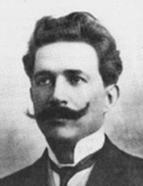

Despite the favourable reception from the press upon its release, América Latina: males de origem was discredited by critic Silvio Romero, Bomfim's compatriot and a leading figure in Luso-Brazilian literary circles. Romero, a staunch proponent of Aryan or Germanic racial superiority, often privileged debates on racial theories over other aspects of intellectual life. This polemic has been frequently highlighted by commentators, who either focus on the racialist theories or the rivalry between the two intellectuals for prestige in the intellectual field (Aguiar, O rebelde esquecido …, 2013, p. 17; Sussekind, “Manoel Bomfim. A América Latina…”, 2000, p. 609). Romero’s critique, however, extended beyond Bomfim's contradictory views on mestiçagem . In the critic's assessment, Bomfim excessively relied on metaphors, and his historical references were largely limited to the works of Rocha Pombo and Oliveira Martins. Romero accused Bomfim of "parasitizing" Oliveira Martins’ ideas, noting that, out of the 2276 lines in the third part of Bomfim’s book, 1144 were directly borrowed from the Portuguese historian (Romero, 1906, p. 52). Romero even went further, arguing that Oliveira Martins should be credited with the theory of Iberian "parasitism” (Romero, “Manoel Bomfim. A América Latina…”, 1906, p. 95)— a point revisited a century later by Sergio Campos Matos (Matos, "Manoel Bomfim e Oliveira Martins...", 2015, p. 61).
The concepts presented in América Latina: males de origem were further developed by Bomfim in his later works, including the trilogy O Brasil na América [Brazil in America] (1929), O Brasil na história [Brazil in History] (1930), and O Brasil nação [Brazil the Nation] (1931). Despite this, his bibliography faded into obscurity for decades (Alves Filho, “ Pensamento político no Brasil …” 1979). Some attribute this neglect to the fact that Bomfim was "ahead of his time," proposing an analytical perspective that sought to "reconcile nationalism with socialism" (Leite, “Manoel Bomfim: ensaio…”, 1983, p.276).
This work is financed by national funds through FCT - Foundation for Science and Technology, I.P, in the scope of the projects UIDB/04311/2020 and UIDP/04311/2020.
